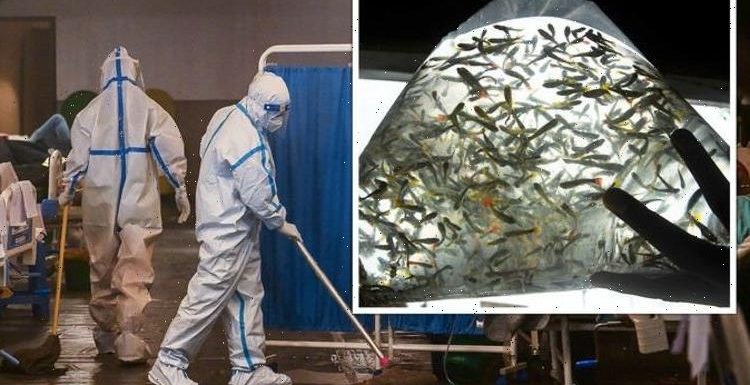
India: Munir Akram criticises ‘obstructionist actions’
We use your sign-up to provide content in ways you’ve consented to and to improve our understanding of you. This may include adverts from us and 3rd parties based on our understanding. You can unsubscribe at any time. More info
It comes after more than 80 people died in India’s Uttar Pradesh region following an outbreak of a “mystery disease”. The illness has since been confirmed as dengue – and now officials are taking the fight back with “killer” fish. The disease, which causes severe joint pain and stiffness, is spread by mosquitoes, which breed by laying eggs in standing water.
Each gambusia – or mosquitofish – can eat up to 150 mosquito larvae in just eight hours.
Chandra Vijay, the district magistrate for Firozabad, in Uttar Pradesh, said: “The water bodies are very large and we can’t spray chemicals to kill the mosquitoes as it will devastate the biological life in ponds.
“Furthermore, a lot of these ponds are inside villages and other inhabited areas and the chemicals used might contaminate the groundwater and affect the health of residents
The mosquito killing fish have successfully helped control the insects in India’s capital, Delhi, and in the western state of Punjab.


Approximately 10,000 people have been infected by dengue so far in Uttar Pradesh – but that figure os believed to be much higher.
The state is home to over 200 million people.
It comes as the country is already fighting a hard battle with COVID-19, particularly the Delta strain and threatens to overwhelm hospitals.
Dengue is a mosquito-borne viral infection, found in tropical and sub-tropical climates worldwide, mostly in urban and semi-urban areas.
Transmitted by female mosquitoes, dengue is mainly a tropical disease and has been circulating in India for hundreds of years.

While many infections produce only mild illness, cases can develop potentially lethal complications.
According to the World Health Organisation, in its most severe form, there is no specific treatment.
It comes after ruling Bharatiya Janata Party (BJP) lawmaker Manish Asija from Firozabad, one of the worst-affected regions, said many children were dying of the disease.
Mr Asija called the situation alarming and said the reasons could be “water-logging, lack of sanitation and hygiene are the reasons behind the disease spread.”
In the Seventies, the flu-like virus was endemic in just nine countries.
DONT MISS
Britain enjoys wine boom amid perfect conditions [REVEAL]
Vaccine breakthrough as study finds only 11% decline in protection [REPORT]
‘Life-saving technology’ praised for reducing fatal car accidents [ANALYSIS]


But now climate change, increasing urbanisation and international travel mean the disease has taken hold in more than 100 countries, with roughly half of the world’s population now at risk.
It is estimated to affect around 100 million people every year.
Experts have warned that India will see increasing outbreaks of vector-borne diseases like dengue over the upcoming years.
Dr Prabhat Jha, Professor at the Centre for Global Health at the University of Toronto, said: “In the short term, my concern is vector-borne diseases, where disruption to eradication measures means they are the ones most likely to roar back.”
Source: Read Full Article